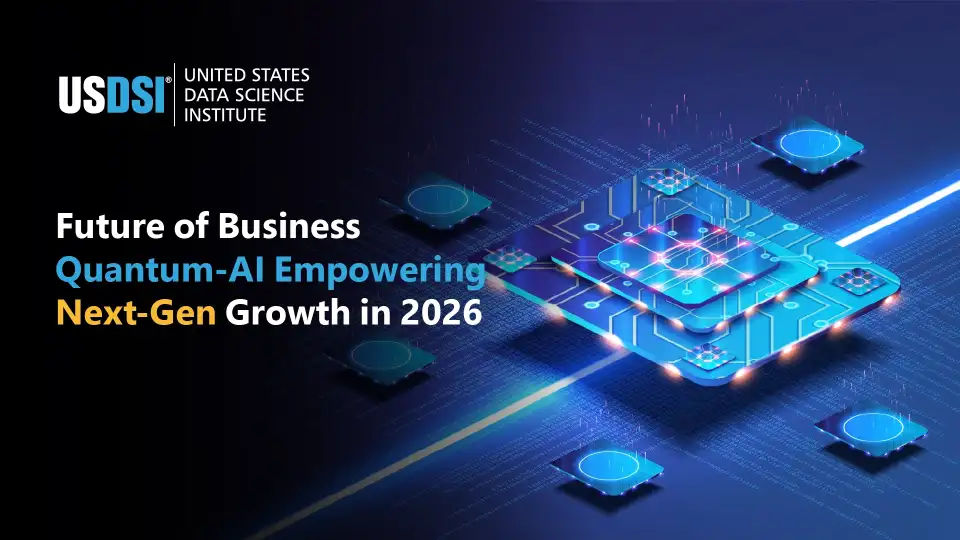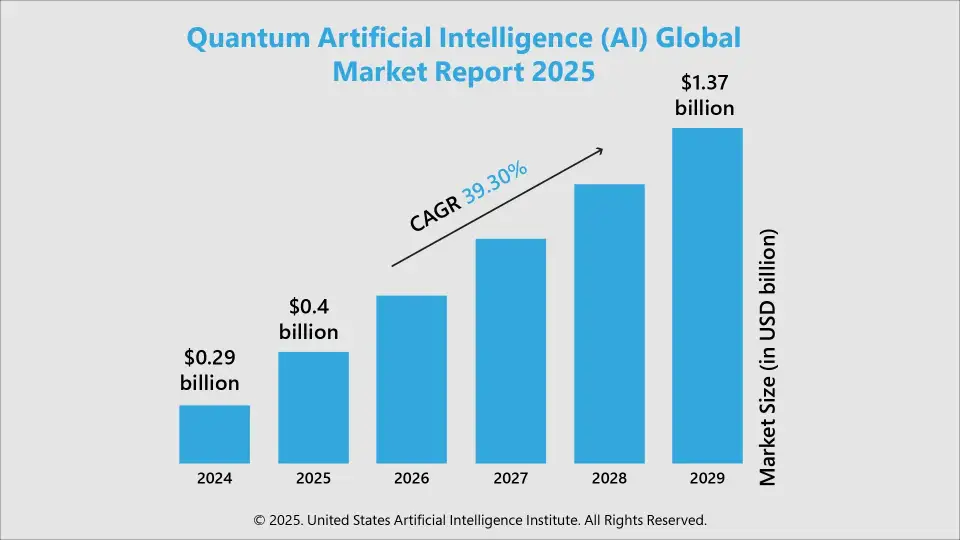
Technology often rewrites the rules of business every few decades. What if the next significant business transformation is not limited to AI? What if ‘next’ is the combination of two super-intelligent technological evolutions?
Organizations are venturing into an era where impossible problems, such as massive data, complex simulations, are being addressed by Quantum AI. This is not just a new AI and Data Science trend; rather, it will be the major technological emergence powering the next-generational business workflows.
Quantum Computing and AI: Transforming Modern Workflows
AI enables machines to think, and Quantum computing enables them to think more quickly than thought itself. While classical computing processes bits of data one at a time, quantum computing processes them all at once. In other words, a quantum machine can examine all potential responses simultaneously rather than one at a time. The outcomes are more dramatic when AI and Quantum Computing work together.
In more business-oriented words, Quantum-AI doesn’t just make AI faster; it makes it truly scalable for problems that had always felt out of human reach.
What is Quantum AI?
Quantum-AI emerges from the fusion of Quantum computing principles such as superposition, entanglement, and quantum parallelism with Artificial Intelligence algorithms that learn, reason, and predict.
AI provides the thinking power, while Quantum computing provides processing strength. Hence, a powerful combination that, together, can literally change industries and open new economic horizons for them.
According to The Business Research Company, the Quantum AI market is expected to grow to USD 1.37 billion in 2029.

Now, could you imagine how much Quantum AI utilization in business workflows will increase by then? Let’s understand some other crucial aspects of Quantum computing and AI integration.
Why Businesses Are Moving Toward Quantum-AI?
Anything that needs intelligence beyond human analytical capacity is in high demand. Today, even the most influential supercomputers can’t keep up with the variables that companies deal with. Quantum-AI changes that. Organizations are already using it for:
Things changed when D-Wave Quantum released an open-source Quantum-AI toolkit that seamlessly plugs into PyTorch, one of the most used AI frameworks. This breakthrough finally allowed data scientists to leverage AI and quantum computing in their day-to-day, deep-learning environments.
Quantum Computing and AI: Leading Business Transformation
Beyond mere speed or processing parameters, Quantum computing and AI are the re-imagination of intelligence. The following are the 7 most important trends that are transforming the next-gen business workflows.
1. Multi-dimensional problem-solving
Quantum AI facilitates the ability of a model to assess several factors and potential outcomes simultaneously. Instead of the usual continuous path followed by classical AIs, enterprises may model entire global chains, market operations, large-scale progeny, and available sets of variables within a single computational cycle.
2. Continuous adaptive optimization
Quantum-driven models of learning never remain still. They redesign in real-time, reaching every potential construct of a challenge and mimicking each one dynamically, which is perfect for finance, logistics, cost calculation, etc.
3. Sustainable intelligence
Quantum algorithms operate on natural parallelism, and it takes significantly less energy than the giant AI clusters currently in use. As a consequence, Quantum AI is a pillar of sustainable, scalable enterprise computing and eco-efficient data centers.
4. Fault-Tolerant and Resilient Learning Systems
Quantum AI systems are intrinsically adept at addressing noise and uncertainty; leveraging quantum error correction and AI-based stabilization, they stay reliable and robust without data completeness, changing learning patterns or environments.
5. Bridging Symbolic and Neural Reasoning
Quantum AI enables simulation processing of logical and probabilistic reasoning, such that AI models can interpret, reason, and learn all together at once. They are no longer limited to developing predictions; they can sense, respond, and explain truly.
6. Predictive Precision at Scale
Quantum-enhanced machine learning can support vast pattern detection with higher forecasting than ever before; enterprises may use these superpowers to get as close to zero latency as possible while also gaining deep explanatory insights into climate forecasting, consumer behavior, and risk management.
7. Enterprise-Ready Integration and Scalability
The largest advancement in performance, Quantum-AI, is now being processed and released via hybrid clouds and API, allowing it to be reintegrated into AI infrastructures without the need to rebuild the entire network.
Top Quantum Computing Jobs in 2026
As Quantum computing has been a technological trend for too long, gaining expertise in Quantum computing can help you land in the high-paying Quantum computing jobs, such as:
|
Top Quantum Computing Jobs |
Average Salaries |
|
Applied Quantum Algorithm Developer |
$203723 per year (Glassdoor)
|
|
Quantum Software Engineer
|
$147,524 /year (ZipRecruiter) |
|
Quantum Hardware Engineer
|
$146,230 /year (ZipRecruiter) |
|
Quantum Machine Learning (QML) Engineer
|
$128,769 /year (ZipRecruiter) |
|
Quantum Cryptography Engineer
|
$83,088 /year (Indeed) |
|
Quantum Computing Research Scientist
|
$130,000/year (Quatum Jobs USA) |
|
Quantum Physicist
|
$2,60,628/year (Glassdoor) |
Challenges of Quantum AI in Businesses
However, as promising as it is, Quantum-AI comes with several barriers that need strategic action plans. They include:
Preparing for Quantum Supremacy
Quantum supremacy is achieved when Quantum computers complete real-world tasks more effectively than classical ones. Smart companies are currently acting to achieve that in the following ways:
This transformational era will not only have AI, but it will also offer Quantum AI that is empowering modern businesses in 2026 and beyond.
This website uses cookies to enhance website functionalities and improve your online experience. By clicking Accept or continue browsing this website, you agree to our use of cookies as outlined in our privacy policy.